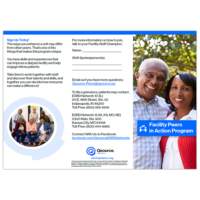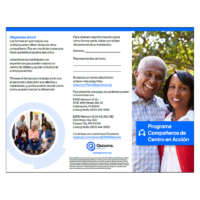
Facility Peers in Action
Qsource ESRD Networks have always been dedicated to improving the quality of life for End-Stage Renal Disease (ESRD) patients. One of the greatest ways the Networks are effective in doing this is highlighting the importance of the patient voice. Research tells us that patients who are knowledgeable about their disease and participate in their healthcare have better health outcomes. Qsource ESRD Networks recognize that patients feel peer-to-peer communication is one of the most valuable ways to share this knowledge. In an effort to have patients and staff work with us to improve facility culture and communication, Qsource ESRD Networks have created the Facility Peers in Action program.
The Facility Peers in Action program provides an avenue to increase communication among patients, facility staff and the Networks. The Facility Peers in Action program aims to provide patient-to-patient support, help establish bridges of communication between patients and staff, as well as help facilities meet some of the patient participation requirements in the Conditions for Coverage (CfC). Ultimately, it will help the Centers for Medicare and Medicaid Services (CMS) better understand patient and facility needs. CMS will look to the Peers in Action to provide the patient viewpoint on topics of special interest to both patients and facilities.
By launching the Peers in Action program, the Networks seek to provide innovative ways to increase patient education, patient engagement and facility involvement. We will work with Peers in Action and Facility Staff Coordinators to develop educational resources and to learn the best practices needed for patients to live well with kidney disease.

Download: Building a Bridge
Program Resources
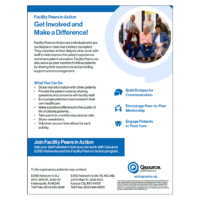
Download: Facility Peers in Action Program Flyer
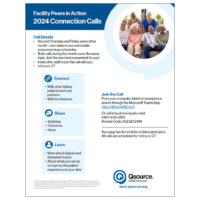
Download: Peer Connection Call Schedule
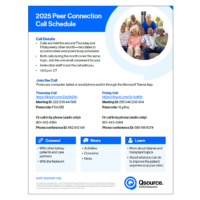
Download: 2025 Peer Connection Call Schedule
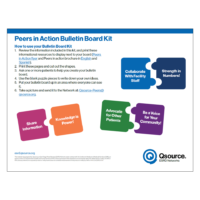
Download: Peers in Action Bulletin Board Kit
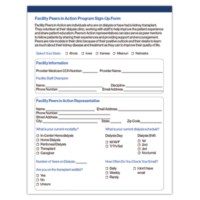
Download: Facility Peers in Action Sign-Up Form
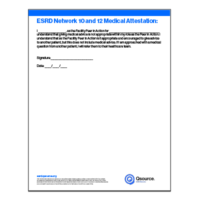
Download: Peer in Action Medical Attestation
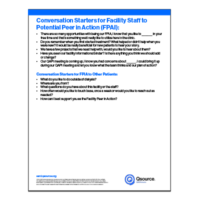
Download: Peer in Action Conversation Starters
Program Structure & Participant Roles
Program Structure
Overall, the PEERS in Action program has two key individuals in each dialysis facility, the PEERS in Action representative and the Facility Staff Coordinator (FSC). For patients that may need help to be part of the program, family members, or caregivers, as spokespersons are welcome.
The PEERS in Action and the Staff Coordinator will provide information and resources to patients, their families, and caregivers to help them become active with their treatment and advocates in their healthcare. This will help empower patients with knowledge, enhancing their coping skills and quality of life.
In addition, the facility may wish to add Shift Spokespersons to talk with patients who are on different shifts than the PEERS in Action. The PEERS will work with the Staff Coordinator to secure shift representatives and develop a facility-wide communication program for patients, family members and caregivers.
Role of The PEERS in Action
The PEERS in Action will work with the FSC and Network Staff to develop, and implement, effective patient-centered care educational initiatives. PEERS will be asked to promote patient and family engagement programs within the facility.
PEERS provide a voice from the patients to the dialysis facility staff and to the Network staff and committees. They will:
- Inform patients about Qsource ESRD Networks.
- Refer patients and family members to the appropriate dialysis facility staff member when concerns or complaints are shared.
- Be a role model to other patients through involvement with their own treatment.
- Attend Network-sponsored webinars (preferably together with the Staff Coordinator but can also participate from home if access to a computer and internet connection is available).
- Work with ESRD network and facility staff to implement facility-based activities to promote and engage patients as active members of their own health care team.
- Work with facility staff to create a facility-wide patient communication system based on the recruitment of patient spokespersons for each of the shifts at the facility.
- Provide the patient voice as a Subject Matter Experts (SME) for the Centers for Medicare and Medicaid Services (CMS) and the Networks as requested. (SMEs are committed and informed patients who through their unique knowledge and experience as patients, are able to provide the patient perspective to the Network’s quality improvement activities and educational campaigns.)
As a PEERS in Action participant, you may be asked to:
- Participate in focus groups, meetings and panel discussions that will focus on themes and suggest activities to promote patient and family engagement at the facility level.
- Hold general meetings on a regular basis in the facility to familiarize the shift spokesperson(s) and other interested persons with facility activities and to gather and document the ideas, needs concerns and comments of the facility patients and staff.
Role of the Facility Staff Coordinator
To function effectively, the PEERS in Action program requires the appointment of a facility staff member to act as a Facility Staff Coordinator (FSC). The Staff Coordinator will work with the PEERS in Action representative to communicate with the facility administration, other departments and the patient shift representatives.
They will:
- Attend Network-sponsored webinars and encourage active involvement of the PEERS in Action.
- Work with ESRD Networks and PEERS in Action to implement facility-based activities to promote and engage patients as active members of their own healthcare team.
- Work with PEERS in Action representative to create a facility-wide patient communication system base (which can be used to secure patient spokespersons for each of the shifts at the facility).
- Facilitate participation of the PEERS in Action representative, when they are called upon to act as Subject Matter Experts (SMEs) by the Networks and/or CMS.
- On a regular basis, hold general meetings in the facility to familiarize the shift spokesperson(s) and other interested persons with facility activities. The meetings will also be used to gather and document the ideas, needs, concerns and comments of the facility patients and staff.
Role of the Shift Spokesperson
Keeping the lines of communication open and moving among a large number of patients spread over several shifts is not an easy task. Depending on the size of your facility, the number of patients in your community and the number of shifts, the PEERS in Action and Staff Coordinator may decide to secure additional patients and/or other family members to act as a Shift Spokesperson(s). These shift spokespersons will assist them in getting the word out or receiving feedback on different shifts.
Facility Role
As a leader in your dialysis facility, your assistance is essential to successfully promote and implement the PEERS in Action program. Through this program, your facility and your patients will have access to free educational webinars, new educational resources, and a direct line of communication to the Network and other program participants.
You have the ability to enhance the communication process in their facility by adding to the roles of the PEERS in Action and Facility Staff Coordinator. Additional staff members and patients will be able to attend the Network-sponsored webinars, but it will be extremely important for the PEERS in Action and the Facility Staff Coordinator to attend.
Family members may also participate as spokespersons for the various shifts as we also want to hear the voice of the family.
The Facility Administrator will:
- Identify a patient to act as your PEERS in Action representative and a staff member to act as the facility liaison or Staff Coordinator.
- Through the efforts of the PEERS in Action and the Staff Coordinator, develop best practices that may be shared with other dialysis units.
- Structure
-
Program Structure
Overall, the PEERS in Action program has two key individuals in each dialysis facility, the PEERS in Action representative and the Facility Staff Coordinator (FSC). For patients that may need help to be part of the program, family members, or caregivers, as spokespersons are welcome.
The PEERS in Action and the Staff Coordinator will provide information and resources to patients, their families, and caregivers to help them become active with their treatment and advocates in their healthcare. This will help empower patients with knowledge, enhancing their coping skills and quality of life.
In addition, the facility may wish to add Shift Spokespersons to talk with patients who are on different shifts than the PEERS in Action. The PEERS will work with the Staff Coordinator to secure shift representatives and develop a facility-wide communication program for patients, family members and caregivers.
- PEERS in Action
-
Role of The PEERS in Action
The PEERS in Action will work with the FSC and Network Staff to develop, and implement, effective patient-centered care educational initiatives. PEERS will be asked to promote patient and family engagement programs within the facility.
PEERS provide a voice from the patients to the dialysis facility staff and to the Network staff and committees. They will:
- Inform patients about Qsource ESRD Networks.
- Refer patients and family members to the appropriate dialysis facility staff member when concerns or complaints are shared.
- Be a role model to other patients through involvement with their own treatment.
- Attend Network-sponsored webinars (preferably together with the Staff Coordinator but can also participate from home if access to a computer and internet connection is available).
- Work with ESRD network and facility staff to implement facility-based activities to promote and engage patients as active members of their own health care team.
- Work with facility staff to create a facility-wide patient communication system based on the recruitment of patient spokespersons for each of the shifts at the facility.
- Provide the patient voice as a Subject Matter Experts (SME) for the Centers for Medicare and Medicaid Services (CMS) and the Networks as requested. (SMEs are committed and informed patients who through their unique knowledge and experience as patients, are able to provide the patient perspective to the Network’s quality improvement activities and educational campaigns.)
As a PEERS in Action participant, you may be asked to:
- Participate in focus groups, meetings and panel discussions that will focus on themes and suggest activities to promote patient and family engagement at the facility level.
- Hold general meetings on a regular basis in the facility to familiarize the shift spokesperson(s) and other interested persons with facility activities and to gather and document the ideas, needs concerns and comments of the facility patients and staff.
- Facility Staff Coordinator
-
Role of the Facility Staff Coordinator
To function effectively, the PEERS in Action program requires the appointment of a facility staff member to act as a Facility Staff Coordinator (FSC). The Staff Coordinator will work with the PEERS in Action representative to communicate with the facility administration, other departments and the patient shift representatives.
They will:
- Attend Network-sponsored webinars and encourage active involvement of the PEERS in Action.
- Work with ESRD Networks and PEERS in Action to implement facility-based activities to promote and engage patients as active members of their own healthcare team.
- Work with PEERS in Action representative to create a facility-wide patient communication system base (which can be used to secure patient spokespersons for each of the shifts at the facility).
- Facilitate participation of the PEERS in Action representative, when they are called upon to act as Subject Matter Experts (SMEs) by the Networks and/or CMS.
- On a regular basis, hold general meetings in the facility to familiarize the shift spokesperson(s) and other interested persons with facility activities. The meetings will also be used to gather and document the ideas, needs, concerns and comments of the facility patients and staff.
- Shift Spokesperson
-
Role of the Shift Spokesperson
Keeping the lines of communication open and moving among a large number of patients spread over several shifts is not an easy task. Depending on the size of your facility, the number of patients in your community and the number of shifts, the PEERS in Action and Staff Coordinator may decide to secure additional patients and/or other family members to act as a Shift Spokesperson(s). These shift spokespersons will assist them in getting the word out or receiving feedback on different shifts.
- Facility
-
Facility Role
As a leader in your dialysis facility, your assistance is essential to successfully promote and implement the PEERS in Action program. Through this program, your facility and your patients will have access to free educational webinars, new educational resources, and a direct line of communication to the Network and other program participants.
You have the ability to enhance the communication process in their facility by adding to the roles of the PEERS in Action and Facility Staff Coordinator. Additional staff members and patients will be able to attend the Network-sponsored webinars, but it will be extremely important for the PEERS in Action and the Facility Staff Coordinator to attend.
Family members may also participate as spokespersons for the various shifts as we also want to hear the voice of the family.
The Facility Administrator will:
- Identify a patient to act as your PEERS in Action representative and a staff member to act as the facility liaison or Staff Coordinator.
- Through the efforts of the PEERS in Action and the Staff Coordinator, develop best practices that may be shared with other dialysis units.

